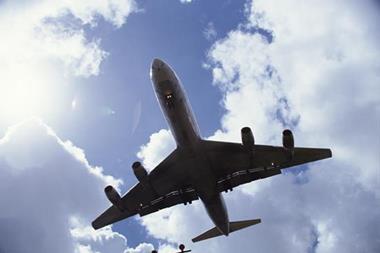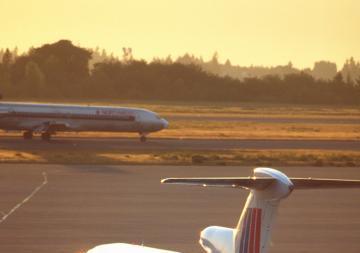AmIgoingDown is a website that allows air travellers to check the likelihood that they will not reach their destination, based on the route and airline they take. The simple answer to the question "Am I going down?" is "No, you would have more chance of being struck by lightning ..."
Every year around 100,000 people are killed on the roads in developed countries alone while fewer than 1,000 die in air crashes. The perception of risk is, however, very different, especially since the terrorist attacks in the US. Equally, the growing success of low cost airlines in Europe and the personal style of their top executives makes them news fodder.
So, there were headlines when an anonymous air traffic controller in the UK expressed concern to the Confidential Human Factors Incident Reporting Programme (CHIRP), the airline safety trust, about 'a growing tendency observed primarily, with some of the 'low cost' airline operators, of flight crew reacting inappropriately to air traffic control clearances and instructions received.'
An air crash where loss of life is involved may prove terminal for an airline's business, and it can have an effect on the share prices of other airlines too. In an analysis of the Air France Concorde crash in July 2000 in Reputation & Value, the case of Corporate Catastrophes, Dr Deborah Pretty notes: 'The corporate impact of the Concorde crash was not restricted to Air France. As British Airways also operates a Concorde fleet, safety concerns and lack of consumer confidence affected this company too as a direct consequence of the crisis, even though the firm was not involved in the accident.'
While no one airline was specifically named in the report to CHIRP, that did not stop UK journalists from trying to identify which low cost airline or airlines the air traffic controller meant. The operators were quick to state that their cost savings were not made on safety.
Ryanair and safety
One such operator is Ireland's Ryanair. An established, low cost European carrier, it is growing rapidly in size and profits despite the effect of September 11, and it has a combative chief executive in Michael O'Leary. It also has an impeccable safety record (as do other low cost airlines), and the stock market was unperturbed by the brief flurry of stories surrounding the CHIRP report. Ryanair's shares actually rose in the days following.
Ryanair is robust in its approach to safety, as in all things, and the airline is fiercely contesting even an improvement notice issued by the Irish Health & Safety Authority in 2001 over baggage handling at Dublin Airport. 'Safety in the airline remains an absolute priority,' says the company in its 2001 annual report.
Transport analyst Stephen Furlong at stockbroker Davy in Dublin comments: "We put a significant amount of weighting on risk management when assessing airlines. Clearly, safety is paramount for all airlines, including the low cost ones."
Ryanair's safety committee is a sub-committee of the main board and its chairman, Michael Horgan, is a non-executive member of that board. He is a former chief pilot of Aer Lingus and a consultant to a number of international airlines, aviation authorities and the European Commission. Other members of the air safety committee are the heads of operations and flight operations, the chief pilot, the flight safety officer and the head of engineering. The committee meets quarterly and reports directly to the board. The flight safety officer is responsible for monitoring and controlling all aircraft-related safety issues.
The management of other fortuitous risk is discussed within the context of internal controls. The Irish Stock Exchange published The Principles of Good Governance and Code of Best Practice, known as the combined code, in November 1998, and the directors of Ryanair state that they are committed to its principles, including responsibility for the system of internal control. Among the procedures in place is a group wide risk management programme, under which the executive management reviews and monitors the financial and non-financial controls to manage the risks facing the business.
External risks
The share price of all airlines plummeted in the wake of the terrorist attacks on September 11. Michael O'Leary's first statement a week later was cautious, but positive. Ryanair had only cancelled 16 of 1,800 scheduled flights in the week following September 11, and half were due to the cumulative impact of additional security measures at some airports. Bookings had returned to normal and an aggressive seat promotion launched shortly afterward produced the desired results.
By the time of the company's annual general meeting on 25 September, Mr O'Leary was prepared to return to the fray: "There is little doubt that tragic events in the US are being used by a number of European flag carriers as an excuse upon which to blame their long standing cost problems and as an opportunity to look for subsidies and hand outs."
Among the factors which he noted had substantially mitigated Ryanair's exposure to the impact of September 11 were:
The results for the year to March 2002 vindicated this confidence: passenger volumes were up 38% and total operating revenues by 28%. Since total expenses rose by only 23%, the profit after tax rose 44%. In January 2002, Ryanair took advantage of the turmoil in the aviation market to order up to 150 new Boeing 737-800 aircraft at an advantageous price. It is well on its way to becoming Europe's largest airline.
By mid-November, Ryanair shares had made up the ground lost in September and reached an all time high in May 2002. Since then the price has drifted down, but the stock has still significantly outperformed both the FTSE and the US NASDAQ on which it is listed in the US. British Airways, by contrast, remained below its pre-September 11 price at the end of June 2002.
Swashes buckled down
On closer inspection, what appears to be a swashbuckling company is revealed as a conservatively managed business with a rigorous approach to all its risks. Analyst Stephen Furlong says that the company's financial risk management policy, is an important factor in keeping costs down and makes the results less volatile.
So far, Ryanair's growth has been organic, which means that it has avoided taking on additional and possibly unknown risk through acquisition. And, says Mr Furlong, there is still plenty of room for more. One clear opening is to 'connect the dots' – increase the links between the airline's destinations. "They can easily double in size and grow safely and profitably," he believes.
The company does have a CEO with a large personality, who expresses his views forcefully and publicly, but Michael O'Leary is not in the mould of charismatic US businessmen who are both president and CEO and who dominate a tame board, even if he does share some of their impatience with officialdom. Not only does Ryanair have a separate non-executive chairman, David Bonderman, co-founder and partner of the private investment house Texas Pacific Group, but all the other directors except Mr O'Leary are non-executive, including safety sub-committee chairman Michael Horgan.
And in risk management terms, a strong CEO can be invaluable. Deborah Pretty has found through her research that in a crisis, personal leadership from the top is the single most important factor in determining whether a corporation survives or goes into terminal decline.
Originally, a loss making, full service airline, Ryanair owes its conversion to profitability to adopting and adapting the "low fares, no frills" approach. There are times when it appears that the Ryanair policy is 'low fares, no charm,' such as when the airline's feted millionth passenger sued the company for failing to honour its promise of free travel for life, and was awarded e67,500.
The success of the Ryanair formula, however, suggests it has read the passenger mood correctly: low cost is what people want. It seems that Michael O'Leary can afford to take some risks with public feelings.
HUMAN FACTORS
From CHIRP's Feedback Issue 62:
"A human factors problem that I believe to be on the increase is a growing tendency observed primarily, with some of the 'low cost' airline operators, of flight crew reacting inappropriately to air traffic control clearances and instructions received.
"…. I would not wish to give the impression that anarchy has broken out or that this problem is occurring more often than not; at the present time, it remains the exception rather than the rule. However, it is occurring with increasing frequency and in my judgment, is due in part to the aggressively commercial ethos that exists within some airline companies and which probably translates into extreme pressure on the flight deck to achieve programmed sector flight times. In consequence, flight crew frustration with anything that interferes with their ability to maintain the schedule, clearly will occur ..."
Lee Coppack contributes a regular company analysis to Strategic Risk. E-mail: lee@coppack.co.uk
'Reputation and Value, the case of Corporate Catastrophes' is available from Oxford Metrica. www.oxfordmetrica.com



















